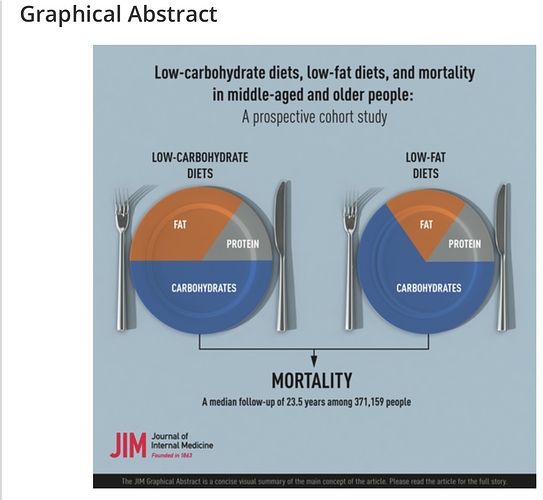Low-carb diets can *increase* your risk of mortality by up to 38%, a new study finds
I can’t access the entire article; but the way they worded the abstract has me wondering. Why is the LCD cause specific mortality only expressed as hazard ratios and the LFD mortality expressed in percentages?
Take the data for what you will. It could be suggestive but certainly not definitive. The scale is interesting. 371,159 subjects tracked for over 23 years. I always thought that a Chinese diet was primarily based on rice as it is cheap? When I have some time I will examine in greater detail and see if there are any nuggets.
Not necessarily. It really depends on the design of the questionnaire. Some have been shown to be more reliable than others, and of course, the opposite is also true. It is very difficult to do any type of proper research on diets, as most studies will not get approved for ethical reasons. Even animal studies are now even harder to get approvals. Primates, closest to humans, are no longer used, at least in the Western world because ethical reasons
I’ll just add one more thought: A hazard ratio of 1.0 means event rates are the same in both groups. The hazard ratio for the healthy LCD was actually less than 1. So if they were comparing the low carb directly to the low fat, wouldn’t that mean the healthy low carb actually came out a little better?
I’ll be interested to see what you find out.
Participants in the highest quintiles of overall LCD scores and unhealthy LCD scores had significantly higher risks of total and cause-specific mortality (hazard ratios [HRs]: 1.12–1.18).
Before getting excited, we need to know the absolute incidence of total and cause-specific mortality. For instance, the difference between 1.0% and 1.18% is not very great. On the other hand, the difference between 60 and 71 people out of 100 starts to look a little better, at least.
Austin Bradford-Hill is supposed to have said that unless the hazard ratio is 2.0 or higher, the study isn’t worth getting out of bed for.
I’m only able to read the shortened summary and as far as I’m concerned it is completely useless. What is a “healthy” vs “unhealthy” LCD or LFD? If nothing else, these terms already suggest a bias in the study in favor or one diet over another.
After reading Uffe Ravnskov’s work, I also refuse to take the “Conclusion” of any study at face value if I can’t read the full experiment notes. It’s extremely common for a study’s sponsors to hire a writer to either spin the conclusion to sound better, or outright lie about what the results indicate.
Yes, I know. I’m not immune to dismissing studies that disagree with my POV while taking those with confirmation bias to heart. Still, this one gives me basically nothing to go on.
I’ve even read a couple of conclusions that essentially say, “Our data call the diet-heart hypothesis seriously into question, but we are still going to recommend a high-carb, low-fat diet, because arterycloggingsaturatedfat, don’tcha know.”
I remember Richard talking about a good study where high-fat diets had the lowest rate of all-cause mortality.
There is no way any study can last that long and be controlled. Studies based on surveys are totally unreliable because you have to assume the participants are telling the truth. I couldn’t give you a detailed list of what I ate last week or even two days ago.
Then we have participants who are 50-70 years old being studied for 23 years and in that time they had over 165,000 deaths out of 371,159 people. How many actually died as a result of their diet. Take any random sampling of that many people of that age group and 23 years from now see how many of them had died. Results may be close to the same just out of randomness.
Who funded the study? Big food or big pharma? It’s usually one or the other.
Judging by the chart they showed it doesn’t look like the low carb diet was very low carb. It looked to me like it was 50% carbs. Then let’s ask what kind of carbs. Highly processed? Whole food? Makes a tremendous difference.
No thanks.
I’ll stick with the studies that show carnivores and keto’ers with high LDL’s have better cardiovascular health in their senior years than those of a fat free diet.
Did you read Ravnskov’s “Fat and Cholesterol Are Good For You?”. It’s an entire book basically devoted study by study to the idea of bad data and worse conclusions.
Do you see the “supporting information”? The wording of the columns tells the whole story!
Just more “plant based” nonsense.
My absolute risk of mortality is 100% and so is yours.
I do not know my risk of mortality in the next 10 years but neither does anyone else.
Lol. Yup. If i understand what I’m looking at here, even in the LCD, “healthy” v “unhealthy” is entirely a matter of saturated fat and animal v. plant protein. Biased much? Let’s see, we’ll run a test to decide which religion is best and if you don’t believe in my deity we’re taking 30 points off before we start. 
Are they seriously defining a diet with 50% carbs as a “low carb diet”??? 




















FFS… what a load of tosh. I will take some notice when they’ve got some research with 10% carbs.
It’s a bit much  But most studies I saw used some quite high carb percentage for “low-carb”…
But most studies I saw used some quite high carb percentage for “low-carb”…
I was unable to do 50% carbs on high-carb, that’s impossibly high for me. But I can’t not eat much fat…
High-carb is ~50% fat, low-carb is ~65% fat in my world and I have no power to change it much (it doesn’t matter what I try or how much I eat, my fat percentage is pretty stubborn). So it’s surely very relevant what other people do with VASTLY different macros and food choices in studies that are probably not reliable anyway… 
My mortality is more complex anyway. I imagine my lifespan would drastically drop if someone took away my fat… But it wouldn’t be so great if they just upped my carbs forcing me into massive overeating every day (I probably would figure out something but only because I am more experienced and stubborn and hedonistic than most people in the study. killing someone would be my first thought, preferably my jailor with those rules and not myself… I am a bit sensitive about my well-being, you see, hence I never could go back to high-carb by my own will. so my mental health would suffer too).
It’s almost as if there’s an agenda going on against low carb, isn’t it? But this is science, right, there can’t possibly be an agenda going on…. Can there???
This study is just so blatantly biassed and stupid. What have we come to that a diet with 50% carbs is considered low carb? These people must live in vegan-land. The problem is that the headlines are what people see, and most will believe them. 


I am still yet to see any credible research to suggest there’s a problem eating zero carb.


